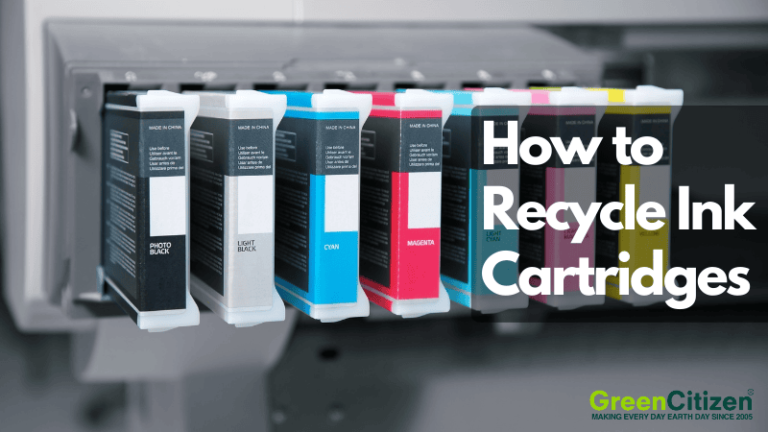Ink cartridge recycling isn’t just about clearing space in your office drawer — it’s one of the simplest ways to reduce e-waste. Every year, over 1.3 billion ink cartridges are used globally, yet less than 30% get recycled.
The rest? They end up in landfills, leaking plastic, metal, and toxic ink into the environment.
If you’re wondering how to recycle ink cartridges safely and responsibly, this guide has you covered. From printer cartridges at home to toner cartridges at work, you’ll learn where to take them, how recycling works, and why it matters more than you think.
Even small actions like recycling ink cartridges help protect the planet and reduce waste.
Key Takeaway: How to Recycle Ink Cartridges and Toners
Recycle ink cartridges through manufacturer take-back programs, office supply store drop-offs, or certified e-waste recycling centers. Avoid placing cartridges in curbside bins. Proper recycling prevents pollution, supports sustainability, and helps recover valuable materials for reuse in the circular economy.
Can You Recycle Ink Cartridges?
Yes — ink cartridges can and should be recycled. Both inkjet cartridges (used in home printers) and toner cartridges (used in office laser printers) contain materials like plastic, metal, and leftover ink that don’t biodegrade and pose environmental risks if landfilled.
When cartridges end up in landfills, they can take up to 1,000 years to decompose, potentially leaking harmful chemicals into the soil and water.
Recycling ink cartridges prevents these materials from polluting landfills and waterways. It also conserves resources by recovering plastics, metals, and ink components for reuse in new cartridges or other products.
Most major printer manufacturers, office supply stores, and certified e-waste recyclers accept used printer cartridges through mail-back programs, in-store collection, or dedicated recycling centers.
Globally, billions of cartridges are used annually — but less than 30% are recycled. Choosing to recycle helps reduce e-waste, lowers demand for new raw materials, and supports a more sustainable, circular economy.
What Are Ink Cartridges?
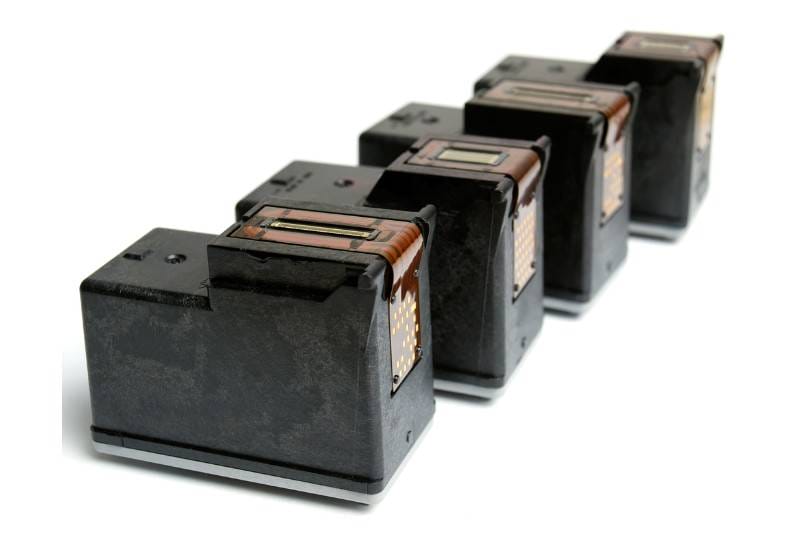
Ink cartridges are essential components of printers, containing either liquid ink (for inkjet printers) or powder toner (for laser printers) that is transferred onto paper during the printing process. These cartridges are responsible for producing everything from simple text documents to detailed color images.
Types of Ink Cartridges
- Inkjet Cartridges: Found in home and small office printers, these contain liquid ink and are typically used for lower-volume, color-rich printing tasks.
- Toner Cartridges: Used in laser printers, these cartridges contain fine toner powder and are ideal for high-volume, high-speed printing in office environments.
- Refillable Cartridges: Designed for multiple uses, these cartridges can be refilled with new ink, offering a more sustainable and cost-effective option.
What Materials Are Inside Ink Cartridges?
Ink cartridges are made from a combination of plastic (typically polypropylene or polyethylene), metals (steel, aluminum, copper), foam sponges, and residual ink or toner powder.
Some cartridges also contain small electronic chips for printer communication, which may include traces of gold or other rare metals.
Why Ink Cartridge Recycling Is Crucial
Improper disposal of ink cartridges contributes to global e-waste problems, as these materials do not biodegrade. In landfills, leftover ink and toner chemicals can leach harmful substances into soil and groundwater, causing environmental pollution.
Additionally, producing new cartridges consumes significant amounts of oil, water, and raw materials.
By recycling ink cartridges, we help:
- Prevent toxic waste from entering landfills.
- Recover valuable materials for reuse in manufacturing.
- Reduce demand for virgin plastics and metals.
- Support the circular economy and sustainability goals.

Read More:
How to Recycle Ink Cartridges: A Step-by-Step Guide
Properly recycling ink cartridges ensures safe handling, prevents environmental harm, and helps recycling facilities recover valuable materials.
Follow these detailed steps to prepare your cartridges for recycling.
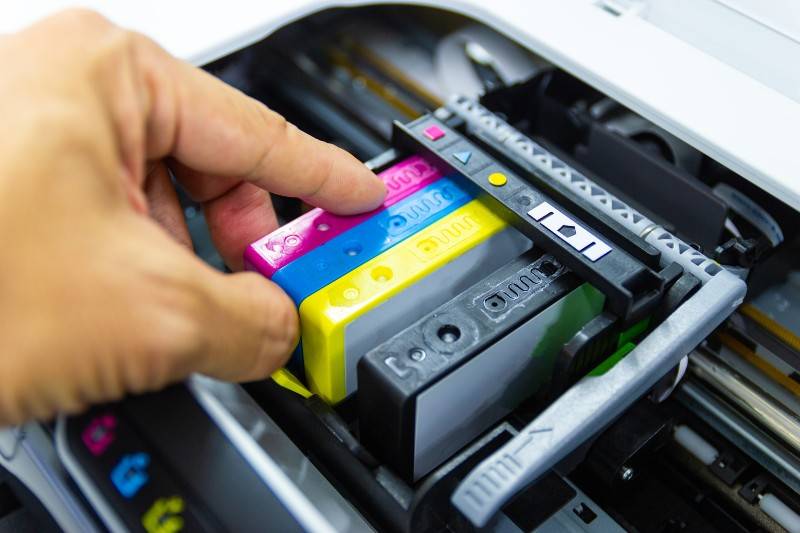
1. Carefully Remove Used Ink and Toner Cartridges
Turn off your printer before removing cartridges to avoid electrical issues. Handle cartridges gently to prevent spills or toner dust release. For toner cartridges, consider wearing gloves to avoid skin contact with fine powder.
➡ Why this matters: Preventing leaks protects your equipment and the environment. Handling carefully avoids contamination and ensures recyclers can process them effectively.
2. Package Cartridges Securely to Prevent Leaks
Place cartridges in a sealed plastic bag, anti-static bag (for toner), or their original packaging. Wrap each cartridge individually. This prevents ink or toner from leaking onto other items or causing contamination.
➡ Pro tip: Never place cartridges directly in boxes with other waste. Ink can stain, and toner powder can pose inhalation risks if spilled.
➡ Why this matters: Proper packaging protects people, surfaces, and other recyclables during transport.
3. Store Cartridges Properly Before Recycling
Keep packaged cartridges in a cool, dry environment away from heat or direct sunlight. Do not store near food, drink, or flammable materials. Avoid stacking heavy objects on top of cartridges.
➡ Why this matters: Heat can cause leaks or cartridge deformation. Proper storage preserves the cartridge’s integrity for recycling.
4. Prepare for Drop-Off or Mail-In Recycling
Ensure cartridges are securely packaged. If mailing, follow the shipping guidelines of the recycler or manufacturer. Some may provide prepaid labels and specific packaging instructions. If dropping off, transport them in sealed containers to prevent spills.
➡ Business tip: For bulk recycling, store cartridges in labeled, leak-proof bins to simplify logistics and comply with waste handling regulations.
Common Mistakes to Avoid
- Don’t dispose of ink cartridges in regular trash; it’s often illegal and environmentally harmful.
- Don’t expose cartridges to heat or direct sun.
- Don’t combine cartridges with other hazardous waste materials.
- Don’t ship loose cartridges without protective packaging.
Why These Steps Matter
Proper preparation ensures:
- Safe handling during collection and transport.
- Efficient recycling and material recovery.
- Compliance with health, safety, and waste regulations.
Where to Recycle Ink Cartridges
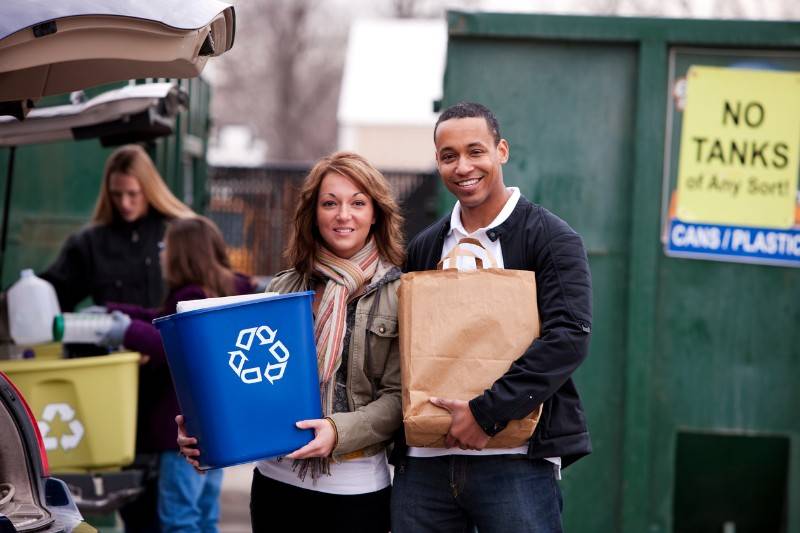
If you’re wondering where to recycle ink cartridges, you have more options than you might think. From retailers and manufacturers to certified e-waste recycling centers, there are convenient programs designed to help you dispose of used cartridges responsibly.
Here’s how to find the best recycling solution for your needs.
1. Retailers That Recycle Ink Cartridges
Several major retailers offer ink cartridge recycling programs, making it easy for individuals and businesses to recycle responsibly. Many of these programs also provide incentives to encourage participation.
Staples Ink Cartridge Recycling
Staples offers $2 in rewards for each recycled ink or toner cartridge, with a limit of 10 cartridges per month. To qualify, customers typically need to be enrolled in Staples’ Rewards program.
Office Depot / OfficeMax Ink Cartridge Recycling
Office Depot and OfficeMax accept used ink and toner cartridges through their Rewards program. Customers can earn points or credits for up to 10 cartridges per month when linked to an active account.
Best Buy Ink Cartridge Recycling
Best Buy provides recycling kiosks at the front of their stores where customers can drop off used cartridges. While they don’t offer monetary rewards, they support responsible disposal of e-waste, including ink cartridges.
Walmart Ink Cartridge Recycling
Walmart accepts used ink cartridges for recycling at many of its locations. Policies may vary by store, so it’s best to check with your local Walmart’s customer service desk.
Retailers make recycling easy by offering local drop-off locations, simple processes, and incentives. These programs help prevent e-waste, support sustainability goals, and provide options for both individuals and businesses looking to recycle responsibly.
2. Manufacturer Take-Back Programs
Many leading printer manufacturers offer free take-back recycling programs for ink and toner cartridges. These initiatives help ensure used cartridges are processed responsibly and support broader sustainability efforts.
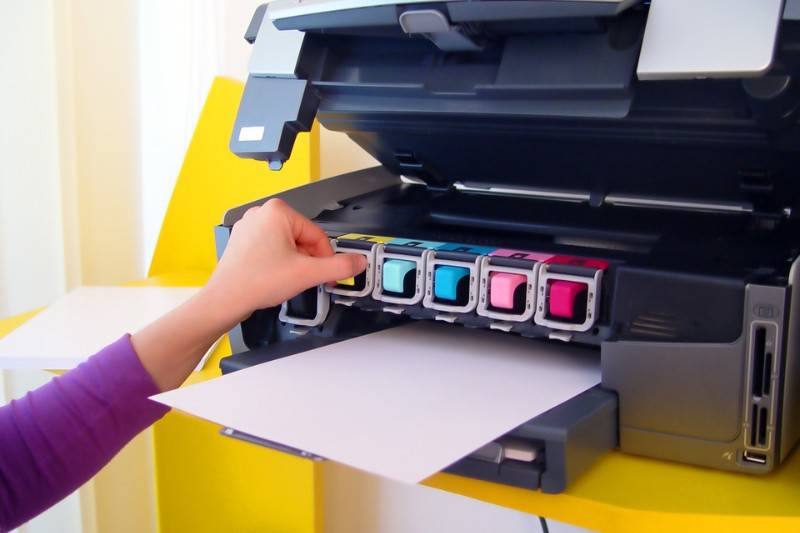
Major Manufacturer Recycling Programs (Most Popular Options)
These brands lead the way with well-established, easy-to-access recycling solutions.
HP Ink Cartridge Recycling (HP Planet Partners)
HP’s Planet Partners Program provides free mail-back recycling for ink and toner cartridges. HP uses recycled plastics from items like bottles and hangers to produce new cartridges, emphasizing a closed-loop recycling system.
- How to recycle: Request prepaid shipping labels from HP’s website.
- Notable feature: One of the most robust and well-known recycling programs in the industry.
Canon Ink Cartridge Recycling
Canon has been recycling toner cartridges since 1990, making it one of the earliest pioneers in this space. The program covers both inkjet and toner cartridges with free return options.
- How to recycle: Download free return labels for mail-in recycling.
- Notable feature: Industry leader in long-term toner recycling innovation.
Brother Ink Cartridge Recycling
Brother offers recycling through mail-back services and reusable packaging. Customers are encouraged to reuse original boxes to minimize waste further.
- How to recycle: Use the original packaging or request a shipping label.
- Notable feature: Focuses on reducing packaging waste alongside cartridge recycling.
Lexmark Ink Cartridge Recycling
Lexmark has provided free cartridge recycling since 1991, demonstrating long-term commitment to environmental responsibility.
- How to recycle: Enroll in Lexmark’s collection programs to receive prepaid labels.
- Notable feature: Decades-long track record of recycling leadership.
Other Manufacturer Recycling Programs (At a Glance)
These manufacturers also offer cartridge recycling but are often less well-known or operate through partnerships.
| Manufacturer | Return Method | Notable Feature |
|---|---|---|
| Xerox | Free mail-back | Green World Alliance: 145M lbs diverted from landfills |
| Samsung | Free mail-back | Emphasizes producer responsibility |
| Ricoh | Free mail-back | Accepts toner bottles and cartridges |
| Sharp | Free bulk returns | Prepaid shipping, ideal for offices |
| Okidata | COREFIDO Partnership | Accepts toner, drums, belts, fusers |
| Panasonic | Third-party partners | Recycles via authorized vendors |
| Dell | FedEx partnership | Free mail-back program through FedEx |
Why Choose Manufacturer Take-Back Programs for Ink Cartridge Recycling?
Manufacturer recycling programs guarantee responsible handling and often feed directly into closed-loop recycling systems.
These programs help organizations:
- Meet ESG goals and reduce Scope 3 emissions.
- Comply with e-waste regulations.
- Simplify recycling through free and convenient solutions.
3. Recycling Ink Cartridges at Local Recycling Centers
If retailer or manufacturer options aren’t convenient, local recycling centers are another reliable way to recycle used ink and toner cartridges. These facilities are typically authorized to handle e-waste and help keep cartridges out of landfills.
How to Find Local Ink Cartridge Recycling Facilities
Use tools like GreenCitizen’s Green Directory to quickly locate certified e-waste recycling centers near you. Simply enter your location to find facilities that accept ink cartridges, toner cartridges, and other printer-related waste.
You can also check with:
- Municipal recycling programs: Many cities include ink cartridges in household hazardous waste collections.
- County e-waste events: Local governments often host electronics recycling events.
- Independent e-waste recyclers: Specialized recycling centers often accept a wide range of electronics, including printer cartridges.

Why Use Local Recycling Centers?
- Reduces transportation emissions compared to mail-back options.
- Keeps recycling efforts within your community.
- Often accepts a wider range of electronics beyond cartridges.
Local recycling is a practical solution for businesses and individuals looking to handle e-waste responsibly without relying on retailers or manufacturer programs.
Why Recycling Ink Cartridges Matters: Key Benefits for Individuals and Businesses
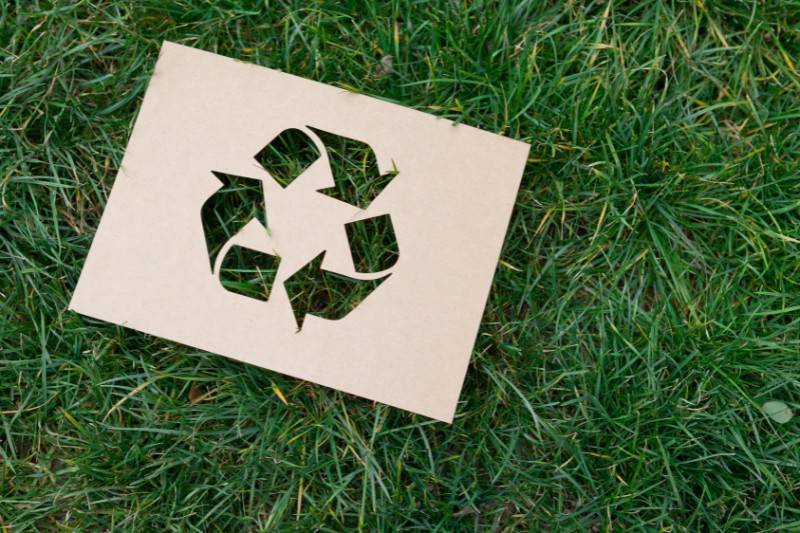
Properly recycling ink and toner cartridges goes beyond reducing waste — it offers tangible environmental, legal, and business benefits. Whether you’re an individual consumer or managing office operations, responsible cartridge recycling delivers value in multiple ways.
1. Environmental Protection
Ink cartridges are made from plastic, metal, foam, and toxic ink residues that don’t biodegrade. If sent to landfills, they can:
- Leach harmful chemicals into soil and groundwater.
- Contribute to plastic waste and pollution.
- Increase demand for virgin materials when recyclable components are wasted.
Recycling prevents pollution and recovers valuable materials for reuse, supporting circular economy goals.
2. Compliance with Environmental Laws
Improper disposal of printer cartridges is often regulated under e-waste and hazardous waste laws. In regions like:
- California (Electronic Waste Recycling Act)
- European Union (WEEE Directive)
- EPA Guidelines (USA)
Businesses and individuals may face fines or legal penalties for sending ink cartridges to landfills. Certified recycling ensures compliance.
3. Supporting ESG and Sustainability Goals
For organizations, cartridge recycling contributes directly to:
- Scope 3 emissions reduction (waste disposal impacts).
- Sustainability reporting metrics (waste diversion, recycling rates).
- Certifications and frameworks like ISO 14001, CDP, and GRI.
These efforts strengthen corporate ESG performance, public transparency, and investor confidence.
4. Enhancing Brand Reputation
Recycling demonstrates environmental responsibility to:
- Customers
- Business partners
- Regulatory bodies
- Employees
A strong recycling program helps build trust, enhances corporate social responsibility (CSR) narratives, and supports green marketing initiatives.
5. Economic and Operational Efficiency
Recycling cartridges through manufacturer programs or bulk recycling:
- Reduces waste disposal costs.
- Provides rewards or incentives from retailers (Staples, Office Depot).
- Supports operational waste reduction strategies.
- Minimizes risk of contamination or environmental incidents from improper storage.
The Bottom Line:
Recycling ink cartridges is a small action with wide-reaching impact — protecting the environment, supporting regulatory compliance, reducing costs, and strengthening business reputation. For organizations focused on sustainability, it’s an essential step in a responsible waste management strategy.
Can You Refill Ink Cartridges?
Yes, refilling ink cartridges is possible and can extend the life of your cartridges while reducing waste. Refill kits are widely available and often used as a cost-saving, eco-friendly alternative to buying new cartridges.
However, refilling isn’t always straightforward. It can be messy, varies by cartridge model, and may void your printer’s warranty. For those who prefer a hassle-free solution, recycling used cartridges through certified programs remains the easiest and most responsible choice.

Read More:
Can You Put Ink Cartridges in the Recycling Bin?
No, you should not place ink cartridges in your household recycling bin.
Curbside recycling programs aren’t equipped to handle ink cartridges because they contain plastic, metal, foam, and residual ink, all of which require specialized processing.
Instead, use designated recycling programs through retailers, manufacturers, or certified e-waste facilities to ensure cartridges are handled properly.
Recycling cartridges through proper channels prevents pollution and ensures valuable materials are recovered safely.
How to Recycle Toner Cartridges (And How It Differs from Ink Recycling)
Toner cartridges, like ink cartridges, should never be disposed of in household trash or regular recycling bins. They contain toner powder, plastics, and electronic components that require specialized recycling processes.
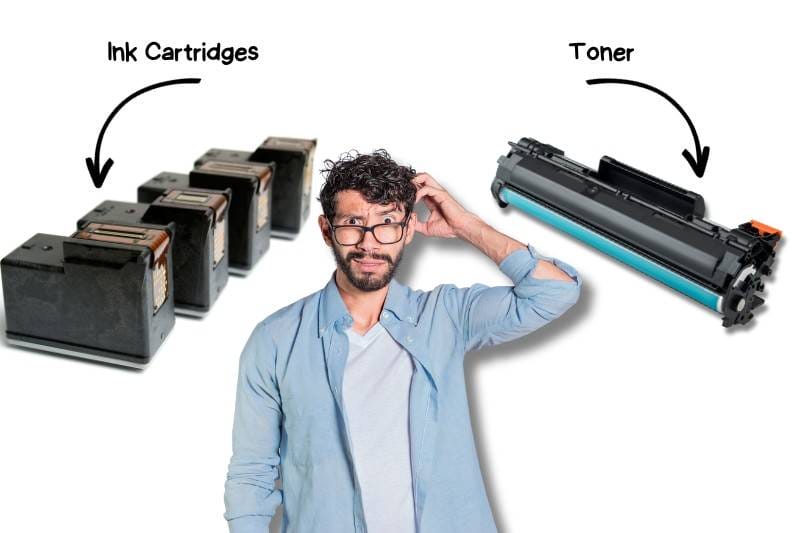
Ink Cartridges vs. Toner Cartridges: Key Differences
| Feature | Ink Cartridges | Toner Cartridges |
|---|---|---|
| Contents | Liquid ink | Fine toner powder |
| Printer Type | Inkjet printers (home use) | Laser printers (office use) |
| Recycling Process | General e-waste recycling | Specialized handling for powder and components |
Toner cartridges require careful processing to contain toner powder, prevent contamination, and recover materials like plastic, metal, and residual toner safely.
How to Recycle Toner Cartridges
Manufacturer Take-Back Programs
Most manufacturers, including HP, Canon, Samsung, Brother, and Xerox, offer dedicated recycling programs specifically for toner cartridges. These programs often provide free mail-in options and collection services.
Retailer Recycling Programs
Major retailers like Staples, Office Depot, and Best Buy accept toner cartridges alongside ink cartridges at their drop-off locations.
Specialized E-Waste Recycling Centers
Some local e-waste facilities are equipped to safely handle toner cartridges, ensuring components like toner powder and plastics are properly processed.
Responsible Ink Cartridge Recycling Makes a Difference
Recycling ink and toner cartridges isn’t optional — it’s a necessary part of responsible waste management. Whether you’re an individual or a business, proper recycling prevents e-waste, reduces environmental harm, supports sustainability goals, and ensures compliance with waste regulations.
With so many convenient options available — from manufacturer take-back programs to local e-waste facilities and office supply stores — recycling your cartridges is easy and impactful. This small action helps reduce pollution, recover valuable resources, and support a circular economy.
When your next cartridge runs out, choose to recycle. It’s a simple step with benefits that extend far beyond your printer.
